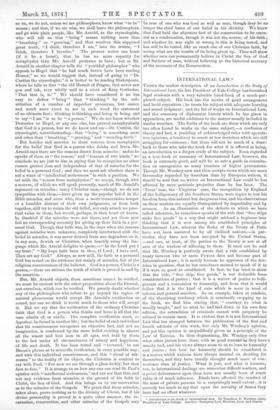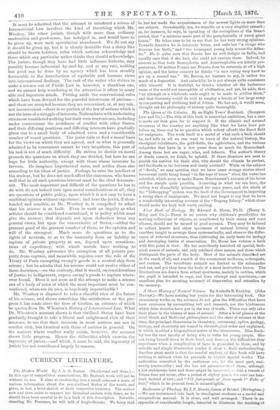INTERNATIONAL LAW.*
UNDER the modest description of an introduction to the Study of International Law, the late President of Yale College has furnished legal students with a very valuable hand-book of a much-per- plexed subject. His book has the merits of good arrangement and lucid exposition ; he treats his subject with adequate learning and sound judgment; and the list of works on International Law, and the summary of diplomatic history which he has given in appendices, are useful additions to the matter usually included in similar treatises. The faults of the book are those which are only too often found in works on the same subject,—a confusion of theory and fact, a jumbling of acknowledged rules with specula- tive opinions, a tendency to assert as law doctrines which are still struggling for existence ; but these will not be much of a draw- back to those who take the work for what it is offered as being, an introduction to a deeper study of the subject. Even regarded as a text-book di summary of International Law, however, the book is extremely good, and will be as safe a guide in consulta- tion on emergencies as many treatises of higher pretensions. Though Mr. Woolsey now and then accepts views which are more favourably regarded by American than by European writers, it should be said that no writer on International Law could be less affected by mere patriotic prejudice than he has been. The 'Trent' case, the Virginius ' case, the recognition by England of the belligerency of the Southern States, were topics to test his freedom from this natural but dangerous bias, and his observations on these matters are equally distinguished by impartiality and by acumen. As an illustration of the defects to which we have called attention, he sometimes speaks of the rule that "free ships make free goods" in a way that might mislead a beginner into thinking that it is now among the established principles of International Law, whereas the Rules of the Treaty of Paris have not been assented to by all civilised nations,—in par- ticular, they have not been accepted by the United States, —and one, at least, of the parties to the Treaty is not at all sure of the wisdom of adhering to them. It need not be said that Mr. Woolsey is perfectly aware that a rule established by treaty between two or more Powers does not become part of International Law ; it is merely because he approves of the doc- trine in question, that he has sometimes seemed to speak of it as if it were as good as established. In fact, he has tried to show that the rule, " free ship, free goods," is not deducible from considerations of justice ; that it is a waiver of justice to belli- gerents and a concession to humanity, and from that it would follow that it is the kind of rule which is most in need of solemn and general sanction. As an example, taken at random, of the theorising tendency which is constantly cropping up in thie book, we find him stating that, " contrary to what is usually taught," and to what he had laid down in his own first edition, the extradition of criminals cannot with propriety be refused in certain cases. It is evident that it is not International Law that has changed between the publication of the first and fourth editions of this work, but only Mr. Woolsey's opinion, and yet this opinion is unqualifiedly given as a principle of the Law of Nations. In thus dogmatising, Mr. Woolsey only does what other jurists have done, with as good warrant as they have 6 usually bad, and his views always seem to us to lean to humanity and justice ; but how far humanity should be considered is is a matter which nations have always insisted on deciding for themselves, and they have usually thought much more of con- venience than of justice. What is just, and what is humane, too, in international dealings are somewhat difficult matters, and a priori deliverances upon them have not usually been of much value or of much influence. Ideals have affected the conduct of the mass of private persons to a surprisingly small extent ; it is scarcely too much to say that upon the morality of States they have had no effect whatever. It must be admitted that the attempt to construct a science of International Law involves the kind. of theorising which Mr. Woolsey, like other jurists, though with more than ordinary moderation and good-sense, has indulged in, and would have to be given np, were such speculation abandoned. We do not say it should be given np, but it is clearly desirable that a sharp line should be drawn between rules which nations acknowledge and those which any particular writer thinks they should acknowledge. The jurists, though they have had little influence hitherto, may possibly become influential by-and-by, and at any rate, nothing but good can be done by an agency which has been steadily favourable to the introduction of equitable and humane views into international dealings. The task of the writer who strives to make a science out of Public Law is, however, a thankless one, and we cannot help wondering at the attraction it offers to many able and ingenious minds. Putting aside the conventional rules which have been devised for the peaceful intercourse of nations— and these are accepted because they are convenient, or, at any rate, not inconvenient—there is no portion of the law of nations which is not the issue of a struggle of interests. Nations have with undeviating strictness considered nothing but their own convenience, including under convenience the avoidance of conflict with other States, and their differing positions and differing interests have gradually given rise to a small body of admitted rules and a considerable number of vexed questions. The jurist toils to find a moral basis for the views on which they are agreed, and as what is generally admitted to be convenient cannot be very iniquitous, this part of his task is not of much difficulty. He strives to decide on moral grounds the questions on which they are divided, but here he can hope for little authority, except with those whose interests he favours. He imagines hypothetical cases, and settles these also according to his ideas of justice. Perhaps he stirs the intellect of the student, but he does not much affect the statesman, who knows well that in all such questions interest must be the chief determin- ant. The most important and difficult of the questions he has to do with do not indeed turn upon moral considerations at all; they are questions of public policy, upon which it is not easy to have a confident opinion without experience; and here the jurist, if clear- headed and sensible, as Mr. Woolsey is, is compelled to admit that his science is at fault. Even in such an inquiry as what articles should be considered contraband, it is policy which must give the answer ; that depends not upon deduction from any general views, but upon the convenience of States,—either the greatest good of the greatest number of them, or the opinion and will of the strongest. Much more do questions as to the rights of neutrals, or as to the immunity from or liability to capture of private property at sea, depend upon considera- tions of expediency, with which morals have nothing to do. Mr. Woolsey advocates the exemption of all private pro- perty from capture, and meanwhile rejoices over the rule of the Treaty of Paris exempting enemy's goods in, a neutral ship from seizure ; but he admits that his science could not evolve either of these doctrines,—on the contrary, that it would, on considerations of justice to belligerents, expose enemy's goods to capture where- ever found. Does it not seem as if the attempt to make a science out of a body of rules of which the most important must be con- ventional, whatever its uses, is hopelessly impracticable?
Mr. Woolsey is disposed to take a cheerful view of the future of his science, and shows something like satisfaction at the pro- gress it has made since the time of Grotius, an estimate of which he quotes from Dr. Wheaton's History of International Law. What Dr. Wheaton's account shows is that civilised States have been gradually brought to take a liberal and enlightened view of their interests, to see that their interests in moat matters are not in conflict with, but identical with those of nations in general. On the matters where conflict really exists, however, the account shows little progress. Hence the difficulties which exercise the ingenuity of jurists,—and which, it must be said, the ingenuity of jurists has not contributed largely to remove.



































 Previous page
Previous page